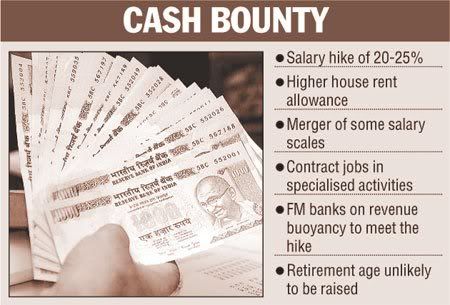And if the provision for railway employees is an indication (Rs 5,000 crore for 14 lakh em-ployees), government employees may be in for a 20%-25% hike. In the current fiscal, the outgo on account of pay and allowances for the government is being estimated at Rs 46,379 crore. However, if one factors in the arrears and pensions with retrospective effect from January 1, 2006, the actual impact could be as high as three times this figure, experts say.
Assuming that the Pay Commis-sion report is implemented by August this year (once it is submitted in March), the government will have to account for arrears with effect from January 1, 2006.
The pay hikes could also trigger revisions in pay scales for other sec-tors like school teachers and universities. The changes in pay scales of these categories will, however, not reflect in the Budget outlays as it would be provided through grants.
Add to this state governments’ li-ability, which will be about Rs 21,285 crore, roughly one and a half times the size of central government’s liability. While state govern-ments are not liable to adopt the recommendations, pressure will be on them to factor in similar increases for their employees.
“The Sixth Pay Commission will have a multiplier effect in the econ-omy; those salaries that are benchmarked against central government will also increase. The relativities are disturbed,” a senior government functionary said.
For the railways, of the Rs 5,000 crore allocated, Rs 500 crore is for pension and the remaining Rs 4,500 crore for salaries, wages and other allowances. For a staff strength of 14 lakh, therefore, the addi-tional Rs 4,500 crore expenditure amounts to an average monthly hike of over Rs 2,000 irrespective of the various grades of employees and officers.
Usually, a central government employee’s total remuneration includes a basic salary, a 51% dearness pay merged with basic and a 41% dearness allowance of the total.
While 90% of the railways are constituted by grades III and IV em-ployees, a similar proportion is true for the remaining set of central government employees. For the civilian departments, the percentage of employees in the higher grades are more, however, this is offset by the fact that in defence, majority of the employees are in the Group D category.
Experts feel that the figures look too low than what was anticipated. But a few feel that the final figure may be moderated because unlike the Fifth Pay Commission, salaries since then have been 100% neu-tralised to the Consumer Price Index (CPI). Therefore, the increases may not be that drastic. Prior to that, for the extent of neutralisation to the CPI was about 75% for the lower grades.
The New Pension Scheme (NPS) is out of the terms of reference for the Sixth Pay Commission, lest political opposition influence defined benefit as against the defined contribution system prescribed in the NPS.
The 40 lakh government employees include those in the armed forces, not taking into account the various grades. Currently, civilian posts in the central government are classified into four groups (A, B, C and D) with reference to their scales of pay.
The Sixth Pay Commission was constituted in October 2006 to rec-ommend comprehensive changes in salary structure of the govern-ment employees. It would give recommendations concerning the pay structure of government employees comprising industrial and non- industrial central government employees, all-India services, armed forces personnel and employees in the Union Territories. Besides, the commission would examine the pay structure for Indian audit and ac-counts department, regulatory bodies set up by Acts in Parliament and Supreme Court employees.
Technorati Tags: New Pension Scheme (NPS) is out of the terms of reference for the Sixth Pay Commission
Del.Icio.Us Tags: New Pension Scheme (NPS) is out of the terms of reference for the Sixth Pay Commission
Continue Reading >>>>More! Pictures

 In what could be a major bonanza for over four million Central government employees, the sixth pay commission on Monday recommended an average hike of 40 per cent in salaries and doubling most allowances that would cost the exchequer Rs 12,561 crore in 2008-09.
In what could be a major bonanza for over four million Central government employees, the sixth pay commission on Monday recommended an average hike of 40 per cent in salaries and doubling most allowances that would cost the exchequer Rs 12,561 crore in 2008-09. 






